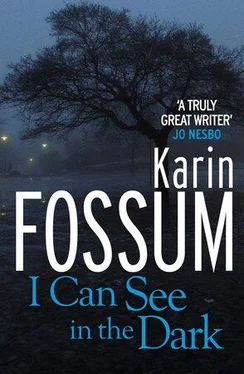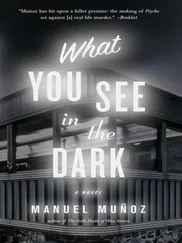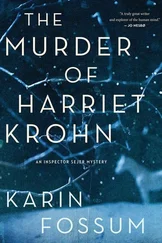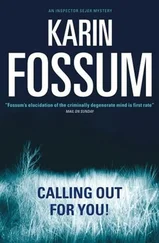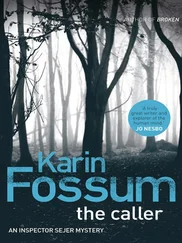‘I’m never wrong,’ Randers replied.
The young officer chimed in. ‘Randers is never wrong,’ he said.
‘Where d’you get all this self-confidence of yours?’
‘It’s been acquired over many years. I know I’m cocky. Experience has made me unbearably arrogant. You’d better believe how really comfortable I am with being me,’ he smiled, ‘and with my job.’
The whippersnapper at his side nodded. ‘Really comfortable!’ he chorused.
‘You’ve been allocated counsel,’ Randers continued. ‘A proper show-off. Whether you’ll like him remains to be seen, but he knows his stuff. He’ll give you many good bits of advice. And we in the force know most of them. But we think a few of them aren’t so great. So when his professional advice is that you can refuse to say anything, don’t listen to him, for God’s sake. Just play ball. Otherwise the entire case will be delayed, and it’ll never be over. We all benefit from your co-operation.’
‘What’s his name, this lawyer of mine?’
‘His name’s de Reuter. Philip de Reuter. You two will make quite a pair.’
‘Will I meet him today?’
‘He’s already been apprised of the case,’ said Randers. ‘So he’ll likely turn up. In the meantime, you can frolic in your eight square metres of cell. There’s enough room in there to change your mind, regarding your guilt. And enough for a victory dance if you’re found not guilty.’
The court complex, the police station and the county jail were housed in one gigantic building. We took the lift from the reception to the fifth floor. Then there were long, lino-laid corridors, smelling strongly of carbolic, after which I was escorted through some double doors. Into isolation, segregation and solitude.
Before me lay another corridor. The light here was brighter and more garish, and there was an almost cave-like silence. Narrow windows high up in the wall.
I took in the length of the corridor with only one thought in my head. That I was innocent. I hadn’t killed Nelly Friis, I hadn’t terminated her life in any way whatsoever, I hadn’t silenced her. I’d done much, but give the devil his due, of these things I was innocent. I was led down the corridor, walking with a heavy tread, my body feeling feeble and apathetic, and my head teeming. On both sides were rows of green metal doors. On a couple, notes had been stuck: ‘CVC.’ Correspondence and visitor check.
‘Will you put one of those on my door?’
Randers didn’t answer, but kept walking.
‘No one will be visiting me,’ I said. ‘There’ll be no one to check. And I’m guaranteed not to get any letters. So, save yourselves the trouble.’
I took in my surroundings and was struck by how clean it was in the prison, as if someone went around with a mop the whole time and kept the dirt at bay. The walls of the corridor were a creamy yellow, there were lots of plants and a small sofa suite with comfortable cushions. On the way we passed a noticeboard, and I managed to glimpse the words ‘Holy Communion’ and ‘Library open’. A man came walking along the corridor to meet us. A sturdy-looking man with an impressive girth, like a barrel on two slender legs, and a great, heavy head on a short neck. He reminded me of a fat duck. He wore a light blue shirt and had powerful hands, and keys and other equipment hung from his belt. His shoes were tough and black and very shiny. His head sprouted a shock of grey hair, which bristled in all directions.
‘De Reuter will be here in an hour’s time,’ he said. ‘But when he says an hour, it usually means two or three hours, he’s a busy man.’
We moved to one of the green doors. There was a jangling from the large bunch of keys hanging from his belt.
‘To survive in here you must learn to be patient. It’s better to realise that from the word go. Most of your time in here is spent waiting. My name is Janson,’ he added. ‘And I’ll be on duty all this week.’
I entered the cramped cell, and stood in the middle of it feeling bewildered, staring at the two men in the open doorway.
‘What do I do if something happens?’ I asked. My voice was weak, and I hated my own pathetic question. I hated them noticing my desperation, because I’m proud by nature.
‘Nothing much can happen in here,’ Janson replied, nodding at the bare, spartan room. ‘But we’ll look after you. Just relax.’
‘I didn’t kill Nelly Friis,’ I said, sinking down on to the modest bed. I held out my hands, they’d begun to tremble.
‘You talk to de Reuter about that,’ Janson said. ‘He’s used to hearing that sort of thing.’
They left, and the green door slammed shut with a hard thud and the lock turned. I went straight to the window and peered out. Perhaps I was hoping that a seagull or a flock of migrating birds would fly past and lift my heart. But the misty sky was empty.
Totally and utterly alone.
Deserted and misunderstood, my rights trampled on. Subject of a terrible mistake. Victim of a dreadful plot. Exhausted and in despair.
I’d never felt so despondent, so completely helpless. For three hours I waited for Philip de Reuter.
In the meantime, I went over my cell inch by inch. The bed was made of grey metal. I lifted it and found that it was as heavy as lead. The wardrobe was metal, too, a cold greyish blue. There was a desk in front of the window, made of a pale, unrecognisable wood, like the chair. A shelf on the wall, supported by two strong brackets. It was empty, of course. The curtains were thick and had green and blue stripes. The floor covering was grey and full of rips and blotches. There was a tiny enclosed space with a basin and toilet of brushed steel as well. It smelt of urine and lavatory cleaner. I lay down on the bed with my hands behind my head, and waited for the sound of a key in the door, waited for this de Reuter to appear and get me out. Out of this ridiculous mix-up. Preferably this very evening, because the whole thing was impossible, and I was still confused. People spent years in these cells, I mused, as I lay there trying to rest. How did they manage to survive it? Maybe they screamed all night long, thumped on the walls and banged their beds about. I wasn’t sure what to expect. At the moment it was still completely quiet. Nothing could be heard except my own nervous breathing in the room. Personally, I wasn’t planning any noisy demonstrations. I have a modicum of self-respect. Occasionally I dozed off, but only lightly. After a while I began to hear a few, muffled sounds. So there are people here after all, I thought, and that must be Janson doing his rounds. Perhaps he’d already taken a look at me through the window in the door. The notion that someone could observe me without my knowledge was exceedingly unpleasant.
Even though I’d been expecting it, even though I’d been imagining everything that would happen from now on, I started when the key turned in the lock. I sat up. A man appeared in the door, dressed in a well-fitting suit, and with a rather stylish briefcase under his arm. He was young, in his mid-thirties perhaps, with a large head of curly hair, and a deep red tie like a stripe of blood from his neck. He was lean, with long slender hands, and bright, dark eyes behind his oval glasses.
‘De Reuter,’ he said, holding out his hand. ‘How are you? Have you got everything you need?’
I took his hand; it was thin and dry. He pulled the chair away from the window, moved it to the middle of the floor and sat down, laying the briefcase on his lap. He adjusted his glasses and sent me one of those quick glances I would come to know so well. Suddenly I felt my anger rising.
‘Have I got everything I need? You’re not being serious, are you? I’ve been picked up by two policemen and hauled off to the station, and then thrown into this cramped cell. And they’re claiming I’ve killed an old woman. And you ask if I’ve got everything I need? What kind of question is that?’
Читать дальше
